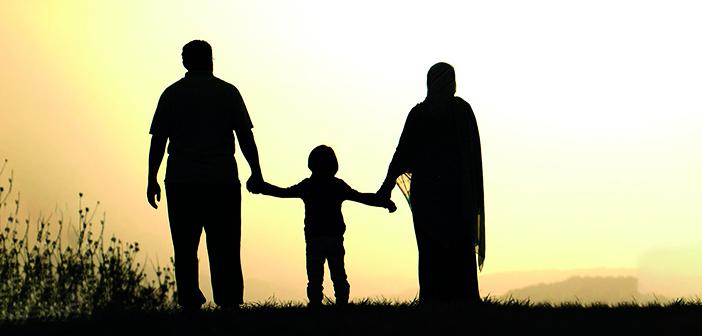When both parents work from home, childcare often means incorporating kids into your daily routine.
This all began a little more than six months ago. My three-year-old daughter and I were driving from our house in Washington, D.C., to her preschool in Northern Virginia. It was a cool day, Donald Trump had not yet been elected president, and the whole city seemed addled by the jittery senility emanating from the White House. We were trapped in Key Bridge traffic. I looked down at the river, a famously languid expanse of swamp, at that moment moving faster than our car. We were going to be late. In the back seat, my daughter began whining.
Suddenly, from down the river came the heavy turn of rotors and the thwacking of blades—and one, two, three, four helicopters appeared from behind the skyline. The American flag decals painted on the sides announced Marine One and Company. The birds roared over our heads and up the Potomac, bearing their principal occupant, no doubt, for one last convalescence at Camp David. My daughter’s eyes followed them the whole way, with all the attention of Mr. Toad beholding his first motorcar.
“I need to ride on a helicopter,” she said. “A dark blue helicopter.”
The traffic lurched forward and I slid across three lanes to our exit.
“Sure,” I replied, without looking back over the driver’s seat. “Soon.”
Now, as every parent of small children knows, soon can mean in an hour, or next week, or, as is often the case, never. Children have little sense of scale, proportion, or time, and are frequently forgetful. But sometimes they do remember things, and usually the things they remember are the very ones you wish they would forget. My daughter likes ballerinas, dinosaurs, krautrock, the Blessed Virgin Mary—and from that moment on, helicopters.
The subject quickly became one of her favorites, and my wife and I were treated to numerous toddler disquisitions on the topic. Some of her comments were amusing, even memorable. But most were just annoying—and delivered in the grating, repetitive tone that members of the four-and-under set affect when they’ve really gone round the pinfold. My daughter wanted to know everything about helicopters, and she demanded that we, her parents, tell her, often while we were working.
Worse, for me at least, she had not forgotten my casual promise. “Soon,” she kept reminding me.
What is a parent to do in this situation? It was not as if I could escape my daughter’s pestering or even put much remove between us. I work at home and so does my wife. We are both editors at little magazines, and we run a separate editorial services business that occupies most of the time we don’t devote to our day jobs. Our daughter, aside from a few hours at preschool three days a week (and the generous, though entirely ad hoc, help from my parents), is typically left to compete for our attention while we struggle through the work day. My wife gave birth to another daughter this spring, a happy event, but also one that intensifies our daily dilemma. We are constantly asking ourselves what to do about childcare.
In this, we are like many other American families. As of last year, among households where a married couple has children, two-thirds of the time both parents work. And they are usually faced with the difficult decision of what to do about their children, especially if the kids are too young to be spending the greater portion of the day at school. Some parents decide to place them in daycare. Others hire a nanny. Both sets pay dearly for those privileges. The rest, whether because of the prohibitive cost or for some other reason, adopt a more informal approach and rely on help from relatives, members of their church community, or, as is surprisingly common, themselves.
We fall into that last camp. This is in part by choice. My wife and I could probably afford some form of daycare—we don’t work two jobs just for fun—but neither of us likes the idea of sending a toddler (or, for that matter, a baby) away all day. Despite the difficulties, we enjoy having our daughter in the house. We think it is good for her. We think it is good for us. To borrow a word from her, we are helicopter parents.
Most people are surprised when I say this. The term “helicopter parent” is not generally used in a positive sense. Quite the opposite. It came into mass circulation at the turn of this century as a descriptor for boomer parents, who, just like a Huey offering air support to the troops in Vietnam, hovered over their millennial children as they advanced on the battlefield of life. Helicopter parenting became widespread around the same time as the cell phone—and the latter innovation enabled the former. It soon became fairly commonplace for parents to call their grown children with reminders to, say, wake up on time for college exams, or, worse, to advocate to their children’s professors when they failed to pass those exams. The increased accessibility of instant messaging and the arrival of location sharing only accelerated the trend and allowed helicopter parents to careen into every part of childhood. These days, parents, like the state or anyone else in a position of authority, have the ability to keep tabs on children at all times, and most do. To some extent, we are all helicopter parents.
But my daughter’s recent obsession has forced me to rethink the term and to reconsider my whole parenting style in light of it. I have neither the time nor the luxury—not to mention the inclination—to hover over her, watching her every move. And yet, by virtue of the fact that both my wife and I work from home, I spend a significant amount of time alongside my daughter, and the temptation to micromanage her can be great. To keep from lapsing into what I consider a counterproductive form of parenting, I have begun to think of things in a new way. When I say that I am a helicopter parent, I do not mean that I am the whirlybird. What I mean is that my wife, my daughter, my baby, and I are all strapped into the same flying machine, oftentimes against our wills, circling and circling above a vast and verdant field that I hope one day we will touch down on, safe, happy, and all in one piece.
In practice, this means that when the adults are working, the kids are also working. If my wife and I are on our computers or in meetings, our daughter is reading Babar to herself or drawing at her easel. Of course, concessions are frequently made to reality. Sometimes, the adult must play kid for an afternoon: on slow days I take my daughter to the swing set in the meadow near our house. But more often, I have found, the kid must play adult. The flexibility of our work life allows for us to bring her along, so long as she behaves, to all sorts of non-kid-coded events. Our daughter has accompanied her parents to lunches, to industry conventions, and, once, a few years ago, to the New Criterion Christmas party. And we are by no means the only parents who behave this way. I know people who have brought their children to the office, into the classroom, onto the worksite, and many other places besides. They do it not because they want to, necessarily, but because they believe it is the best thing they can be doing for themselves and their children at that moment.
When my daughter is in a good mood, our arrangement with her works quite well. When she isn’t—and children’s moods are fickle—it quickly devolves into disaster. I still remember vividly, while at a conference in Florida a few years ago, my wife and I left what we thought was a sleeping child in a hotel crib and slipped down to the bar for a drink. Minutes later an older gentleman came downstairs and announced, to no one in particular, “Up on the fifth floor, there’s a baby, wailing.” We made our exit quickly and with shame. Just as a helicopter sometimes falls out of the air without warning, bringing its passengers to a sudden and violent end, so too can the helicopter parents’ ambitions spectacularly collide with the limitations of their situation.
It is with such limitations in mind that recently both Republicans and Democrats have begun paying more attention to childcare reform. They have good reason to care. The way things in this country work right now, both men and women, mothers and fathers, are expected to work full-time and we are told to bear children and raise them to be good Americans. This system is difficult to sustain, perhaps impossible. The solutions on offer, which range from tweaking the tax code in favor of working parents to more ambitious ideas, such as sweeping state subsidization of daycare, do not seek to ease the underlying tension between the work place and the home. To do so would be to challenge our way of life.
Ours is a culture where parents, many of whom genuinely do want to work and to raise a family at the same time, are in a position of disadvantage. In our own family, my wife and I have found that there is really no way around it; you have to muddle through. What Virginia Woolf said of woman nearly a century ago—that she “must have money and a room of her own if she is to write fiction”—is today true of working parents, and not just the ones trying to write fiction. If both members of a married couple want to play professional, they will need the money to fund this endeavor and the space away from their children, sometimes, to actually get the work done. There are many ways to get the money and the room; none are covered by a single policy, and the needs and demands of each family are so specific and varied that it is unlikely any one, two, three, or four policies could cover them.
The money and the room, I should add, are also not a solution to the problem of working parents. It is just a description of the conditions necessary to get by. Even if you do get them, there is no guarantee that the family side of things will turn out well. Virginia and Leonard Woolf, to take the example of the ones who formulated the description, were able to get both the money and the room at a time when such things were rather difficult. They were by all accounts one of the more successful married working couples of their generation, and they failed miserably when it came to children. Both Woolfs wanted kids desperately, but the demands of two careers—and Virginia’s fragile mental state—left them barren. Childlessness became a subject of lifelong regret for both: “This always rakes me wretched in the early hours,” Virginia confessed to her diary.
And she only knew the half of it! I have kids, and I am still raked wretched in the early hours, as I turn over in my mind all of the ways I have failed to adequately balance the needs of my children against those of my work. The old Philip Larkin lines, from a poem I have always hated, run through my mind as I consider how “man hands on misery to man.” Did I let the baby cry for too long? Should I have locked the door on my daughter when I was trying to type? Was I too stern? We helicopter parents console ourselves that at the end of the day everything will be all right, and in time our children will understand, but there’s no guarantee that the landing will be smooth. That’s one of the most nerve-wracking things about flight: you know the craft will end up on the ground, but you can’t say with certainty how.
Anyway—sometimes the interests of work and children do align. For my daughter and her helicopter ride, “soon” turned out to be a few months after our brush with Marine One. I had reason to be in New York (a lunch here, an exhibition there) and a bunch of expiring airline credits. My wife was heavily pregnant with the baby—and had projects of her own—so the trip became an extended take your kid to work day. What better way to get out of JFK, I thought, than to take the helicopter taxi to Midtown Manhattan?
I mentioned the idea, casually, to my daughter over dinner one night.
“Tomorrow?” she asked.
“No, in a few weeks.”
“Okay. Tomorrow.”
Tomorrow or in a few weeks, she didn’t care. All that really mattered was that she got to come. On the appointed day, we arrived at the airport early for the hop up to Long Island, so short that the plane never breaks into the upper stratosphere. My daughter was disappointed in the airline for using the flight’s brevity to withhold snacks from us passengers. But she was grateful when, once we reached the helipad lounge at JFK, one of the stewards offered to make her a cup of hot chocolate.
As she sipped on Swiss Miss, I surveyed the room. One of the secrets of the private aviation industry is that it does not really cater to the upper crust but rather to the vulgar rich and those for whom there is a professional imperative to use its services. Aside from the three-year-old, the room was mostly filled by men in close-cut suits with gelled back hair, nervously looking at their Apple watches. I picked up the print edition of Air Mail and read an interview with Gwyneth Paltrow, who declared, “I’ll fall asleep to a murder show. It’s sort of like a lullaby for me,” while we waited for our chopper to arrive. My daughter’s feet dangled from her chair, and our fellow travelers smiled at her.
“Good morning, princess,” one said.
“I’m not a princess,” she replied matter-of-factly. “I am a ballerina.”
A few minutes later, a heavy rhythmic rumble outside notified us that it was time to go. My daughter and I followed the other passengers out to the tarmac where, to her surprise and delight, a dark blue helicopter sat waiting for us. As we walked under the rotors, the pulsing air stirred up a tempest in her hot chocolate, and the drink spilled all over the asphalt. The pilot hopped out of the cockpit and dumped the rest of it. He then lifted my daughter into the back seat, handed her a pair of headphones, and fastened her seatbelt.
“And will there be snacks?” she shouted over the din.
Then we were off. Helicopters are the motorcycles of the air, and during liftoff especially, you feel exposed. My stomach jumped, and I felt an uneasy weightlessness. I looked down while we zipped out over the polluted marshes and the flat expanse of Brooklyn. The projects, the warehouses, the well-kept brownstones—all of it passed under us in a few minutes. Soon we were crossing the East River and rounding the tip of Manhattan over the harbor. As we passed by the Financial District, the pilot banked in for a seasick view of the World Trade Center, and I saw our reflection in its sheet glass windows.
I turned to my daughter. She was transfixed by the world laid out before her, so various, so beautiful, so new. In time she will discover nothing is so dazzling except when seen from a great height. The world below is a messy, complicated place, but as we made our descent I felt a strange peace in the knowledge that we were approaching it together.
Source: https://commonplace.org/2025/06/30/helicopter-parenting/






